THE POWER OF GOD UNTO SALVATION

THE POWER OF GOD UNTO SALVATION
Introduction
Part 1: God wants all men and women to be saved.
How is God able to save US from sin and death?
Salvation is only through Christ
When will God save men and women?
Summary
Part 2: What must I do to be saved?
The essential steps:
- Humble ourselves, to accept Grace
- Have faith
- Repent
- Be baptized
- Live a life of obedience Once Saved, Always Saved?
Introduction
In our hearts we know that there must be more to life than simply living and dying. We look into space and consider the wonder of creation and realize there is a greater power than ourselves. We look at the complexity of the human body and realize we are not here by accident or chance. So, why are we here and what is the meaning of our existence?
For many, life is full of suffering and misery. Life often seems unfair and without meaning or purpose. But the Creator of the heaven and earth has told us there is meaning and purpose to life. He has told us there is much more to life than simply living and dying.
The Bible tells us that God wants to save all men and women from a meaningless existence and include them in His eternal plan. The Bible is a book of hope and it tells us of the way that leads to SALVATION.
Part 1: God wants all men and women to be saved.
God tells us that He wants to save all men and women:
“This is good, and pleases God our Saviour, who wants all men to be saved and to come to a knowledge of the truth.” (1 Timothy 2:3-4)
“The Lord is not slow in keeping his promise, as some understand slowness. He is patient with you, not wanting anyone to perish, but everyone to come to repentance.” (2 Peter 3:9)
God also tells us that He will fill the earth with His glory and knowledge:
“Praise be to his glorious name forever; may the whole earth be filled with his glory. Amen and Amen.” (Psalm 72:19)
“They will neither harm nor destroy on all my holy mountain, for the earth will be full of the knowledge of the LORD as the waters cover the sea.” (Isaiah 11:9)
“For the earth will be filled with the knowledge of the glory of the LORD, as the waters cover the sea.” (Habakkuk 2:14)
God will fill the earth with His glory and knowledge by saving men and women who know God and reflect His glory.
However, today we see a world that is torn apart by war, disease, poverty, suffering and disaster, and many people do not know, or want to know, anything about God. It is a world that is far from reflecting the glory of God.
When the earth is full of people disobeying God’s laws how can the earth be filled with His glory? Ever since the first human failure in the garden of Eden, all men and women have inherited a natural tendency to disobey God. As a result, all people sin and eventually die:
“Therefore, just as sin entered the world through one man, and death through sin, and in this way death came to all men, because all sinned.” (Romans 5:12)
Before the earth can be filled with God’s glory, sin must be removed. When sin is removed all the problems associated with sin will also disappear. For this to happen, God has told us about His plan of salvation. Without such a plan, the earth would never reflect the glory of God and we would be without hope.
How is God able to save from sin and death?
Consider the steps that led to the introduction of sin and death in the Garden of Eden:
- The earth was full of God’s glory until Adam and Eve disobeyed God’s commandment (Genesis 2:16-17; 3:6-13).
- They were punished with a mortal (dying) nature that would experience suffering (Genesis 3:15-19).
- All people have inherited the same mortal nature (Romans 5:12, 1 Corinthians 15:21-22).
To remove sin and death and fill the earth with God’s glory, the above steps must be REVERSED. And this is exactly what happened. Jesus Christ succeeded where Adam failed. Jesus never sinned, he was totally obedient to God and as a result he opened a way for God to save us and fill the earth with His glory.
The steps leading to the removal of sin and death can be summarized as follows:
- Jesus Christ obeyed God completely (Hebrews 4:15).
- He was rewarded with an immortal nature that was not able to sin (Acts 2:22-24).
- All CAN inherit an immortal nature (Romans 6:8-12).
It is through Christ than God can save men and women from sin and death. We can be given a nature that will reflect God’s glory perfectly -one that does not experience suffering and does not die:
“For since by man (Adam) came death, by man (Jesus) came also the resurrection of the dead. For as in Adam all die, even so in Christ shall all be made alive.” (1 Corinthians 15:21-22)
It is understandable that Jesus could be raised from the grave and be given eternal life because he was perfect. But how can we, who are sinners, share in this blessing of salvation?
It is by God’s ‘grace’ or favour that we are saved. Although we are personally sinners and deserve death (Romans 6:23), if we follow the essential steps for salvation we will be presented as perfect in the day of judgement (Colossians 1:22, Jude:24). And if we are perfect in the sight of God then we will be rewarded with the same reward He gave to His perfect son -eternal life.
This is an incredible thing for God to do. He is willing to blot out all our failures, see us as perfect and give us a reward so great we cannot fully comprehend it. This highlights the enormous love of God and His great desire to save us.
God’s plan of salvation is like a person putting on a coat to cover himself. When we sin we become symbolically naked in God’s eyes, our human weakness and imperfection is exposed before God. This idea can be seen when the first sin was committed in the garden of Eden. Adam and Eve felt naked and ashamed when they sinned and they tried to cover their nakedness with fig leaves (Genesis 3:7). However, this was not an acceptable covering for their sin and instead, God provided them a covering made from an animal skin (Genesis 3:21).
From this time onwards, the shedding of blood which was required in the provision of the animal skin became an essential requirement for covering sin (Exodus 29:36, Leviticus 1:4, Hebrews 9:22).
Because we are all sinners, we are all ‘naked’ in God’s eyes and need a covering if we are to be seen as perfect and be saved by God.
Today, when we are baptized into Christ, we symbolically put on Christ, and he becomes our covering for sin:
“For all of you who were baptized into Christ have clothed yourselves with Christ.” (Galatians 3:27)
This putting on of Christ is also likened to putting on a white robe that has been made clean by the blood of Christ (Revelation 7:13-14).
Having provided this covering for our sins, God can count us as just and right like Jesus Christ (Romans 5:8-11). But this covering can be spotted by sin (Jude:23) and needs to be kept clean by seeking forgiveness (1 John 1:7-9). Christ also warns us in Revelation that we must ‘keep’ our garments. If we lose our garments by backsliding, we lose our covering for sin and God will not save us:
“Behold, I come as a thief. Blessed is he that watcheth, and keepeth his garments, lest he walk naked, and they see his shame.” (Revelation 16:15)
Salvation is only through Jesus Christ
It is important to realize that salvation is only through Jesus Christ. No one else has lived a perfect life, therefore no one else is qualified to reverse the process that led to sin and death and provide hope for us.
There are Christians and non-Christians who will tell us that as long as we are genuine, sincere and love God we will be saved. They will say there are many roads that lead to salvation and the one we choose depends on our background.
However, the Bible tells us it is through Jesus Christ, and only Jesus Christ, that we can be saved:
“Jesus answered, ‘I am the way and the truth and the life. No one comes to the Father except through me,” (John 14:6)
“. . . It is by the name of Jesus Christ of Nazareth, whom you crucified but whom God raised from the dead, that this man stands before you healed. He is ‘the stone you builders rejected, which has become the capstone.’ Salvation is found in no one else, for there is no other name under heaven given to men by which we must be saved.” (Acts 4:10-12)
“For God did not appoint us to suffer wrath but to receive salvation through our Lord Jesus Christ. He died for us so that, whether we are awake or asleep, we may live together with him.” (1 Thessalonians 5:9-10)
“Although he was a son, he learned obedience from what he suffered and, once made perfect, he became the source of eternal salvation for all who obey him.” (Hebrews 5:8-9)
Salvation by Grace
If salvation is only through Christ that means we cannot earn salvation for ourselves. This means it is a gift:
“For it is by grace, you are saved, through faith -and this not of yourselves it is the gift of God.” (Ephesians 2:8)
We will consider this subject in more detail in Part 2.
When will God save men and women?
The return of Jesus Christ back to the earth must happen before God can save us and fill the earth with His glory. We are told very clearly in the Bible that Jesus is coming back to the earth again:
“Men of Galilee, they said, why do you stand here looking into the sky? This same Jesus, who has been taken from you into heaven, will come back in the same way you have seen him go into heaven.” (Acts 1:11)
When Jesus Christ comes back to the earth, the reward of eternal life will be given to all those who have followed the essential steps required for salvation:
“Behold, I am coming soon! My reward is with me, and I will give to everyone according to what he has done.” (Revelation 22:12)
“For as in Adam all die, so in Christ all will be made alive. But each in his own turn: Christ, the first fruits; then, when he comes, those who belong to him.” (1 Corinthians 15:22-23)
When Christ returns he will re-establish God’s kingdom on the earth. God did have a Kingdom in the past (1 Chronicles 28:5), but because of the wickedness of the kings they were removed and God said there would not be a king again until the return of Christ (Ezekiel 21:26-27 compare with 2 Samuel 7:12-16 and Luke 1:31-33).
The great promises God made to Abraham and David were about this Kingdom on the earth. (For more information on the promises God made to Abraham and David or the Kingdom of God on earth please review our other pamphlet selections).
We are told that the Kingdom will last for 1000 years on the earth (Revelation 5:10 and 20:4). After the 1000 years, sin and death will be completely removed and the earth will be filled with God’s glory (1 Corinthians 15:24-28).
Summary of Part 1
We have seen that:
God will fill the earth with His glory.
- Before He can do this sin and death must be removed from the earth.
- To remove sin and death God made a plan of salvation by sending His son Jesus.
- Jesus never sinned and as a result he reversed the steps that led to death and was given eternal life.
- By God’s grace, if we follow the essential steps for salvation God can see us as perfect and also reward us with eternal life.
- Grace means we cannot earn salvation, it is a free gift.
- The reward of eternal life will be given when Jesus returns to the earth and rules as King over God’s Kingdom.
- After 1000 years, death will be destroyed and sin will be completely removed from the earth.
- The earth will finally be full of God’s glory
Part 2: What must I do to be saved?
The essential steps
There are five essential steps that God requires us to take if we want to be saved:
- Humble ourselves -to accept Grace Romans 3:23-24; Titus 2:11
- Have Faith in God and the Gospel Ephesians 2:8; Hebrews 11:6; Acts 8:12
- Repent and be Converted Acts 3:19; Luke 13:3
- Be Baptized Acts 2:38; Mark 16:16, Acts 8:16, Acts 10:43
- Live a life of Obedience Matthew 28:19-20; 1 Timothy 4:16; Matthew 10:22; James 1:12
Humble ourselves -to accept Grace
The first step is to humble ourselves because there is nothing we can do, or have done, that makes us deserve this wonderful gift of eternal life. We have all sinned and deserve death (Romans 6:23). Eternal life is a gift we cannot earn, we can never expect it as something that is rightfully ours. We are told that it is by God’s grace (favour) that we are justified (made right):
“For all have sinned and fall short of the glory of God, and are justified freely by his grace through the redemption that came by Christ Jesus.” (Romans 3:23-24)
Therefore, we must humble ourselves so we can prepare our minds for the coming of Christ who will bring us salvation:
“. . . All of you, clothe yourselves with humility toward one another, because, God opposes the proud but gives grace to the humble. Humble yourselves, therefore, under God’s mighty hand, that he may lift you up in due time.” (1 Peter 5:5-6)
Have faith in God and the Gospel
God will only save us by His grace if we have faith:
“For it is by grace you have been saved, through faith -and this not from yourselves, it is the gift of God.” (Ephesians 2:8)
“And without faith it is impossible to please God, because anyone who comes to him must believe that he exists and that he rewards those who earnestly seek him.” (Hebrews 11:6)
Not only must we believe that God exists and will reward us, we must also believe in the good news about the Kingdom of God and Jesus Christ. This message was at the very centre of Paul’s preaching:
“Boldly and without hindrance he preached the kingdom of God and taught about the Lord Jesus Christ.” (Acts 28:31)
Belief in the gospel was required before a person was baptized:
“But when they believed Philip as he preached the good news of the kingdom of God and the name of Jesus Christ, they were baptized, both men and women.” (Acts 8:12)
It is also important to have a correct belief about God and Jesus. We are told that true worshippers will worship God in truth:
“Yet a time is coming and has now come when the true worshippers will worship the Father in spirit and truth, for they are the kind of worshippers the Father seeks.” (John 4:23)
We are also told that our eternal life depends on knowing the only true God and Jesus Christ:
“Now this is eternal life: that they may know you, the only true God, and Jesus Christ, whom you have sent.” (John 17:3)
A correct knowledge of God, Jesus and the Kingdom of God can only come through reading the Bible. When Paul preached the good news to those in Berea they did not simply accept what he was saying, rather they searched the Bible to see if what they heard was the truth (Acts 17:11). We too must have this attitude and search for truth.
There are a number of examples in the Bible that show us how God views those who worship Him in the way that they think is acceptable without paying due regard to the way God commanded them to worship Him:
-Cain worshipped God in his own way and was rejected by God. We are told in the New Testament that his works were evil (1 John 3:12).
-The sons of Aaron, Nadab and Abihu, were destroyed by fire from God because they were disobedient in the way they approached and worshipped God (Leviticus 10:1-3).
-In Christ’s day the Jews had turned their worship into one that God saw as vain and empty (Matthew 15:9). And they would be ‘thrust out’ of the Kingdom (Luke 13:28).
Therefore:
“Do your best to present yourself to God as one approved, a workman who does not need to be ashamed and who correctly handles the word of truth.” (2 Timothy 2:15)
Repent
After hearing the truth about God, Jesus Christ and the Kingdom of God, we must repent. Paul tells us:
“Repent, then, and turn to God, so that your sins may be wiped out.” (Acts 3:19)
Repent means, “to change ones mind for the better”. Therefore, we must change the way we think and turn to God. Our whole life must be focused in the right direction as we prepare to make a life long commitment to serve God and walk in the footsteps of Christ.
Be baptized
Although baptism may seem a simple and unimportant thing to do, it has great meaning and significance. We must take the time to understand the meaning of baptism and realize how important it is. Baptism is an essential step and not an optional extra. We are told clearly that belief must be followed by baptism:
“Whoever believes and is baptized will be saved, but whoever does not believe will be condemned.” (Mark 16:16)
The book of Leviticus taught the Jews how to make a sacrifice for sin. The person offering a sacrifice for sin would take the very best lamb and shed its blood. Before it was killed, the sinner would reach forward and place his hand on the head of the animal (Leviticus 4:27-29). In doing this, he would be making a connection with the sacrifice. As he saw this animal rapidly die, he would understand that this animal represented himself. It would remind him how serious sin was and how terrible it is in God’s eyes and he would appreciate the great love of God in providing a covering for his sin.
In a similar way we have forgiveness of our sins today. Through baptism we are making a connection with our perfect sacrificial Iamb -the Lord Jesus Christ. This connection with Christ through baptism is explained in the book of Romans:
“. . . all of us who were baptized into Christ Jesus were baptized into his death? We were therefore buried with him through baptism into death in order that, just as Christ was raised from the dead through the glory of the Father; we too may live a new life. If we have been united with him like this in his death, we will certainly also be united with him in his resurrection. For we know that our old self was crucified with him so that the body of sin might be done away with, that we should no longer be slaves to sin -because anyone who has died has been freed from sin. Now if we died with Christ, we believe that we will also live with him.” (Romans 6:3-8)
In baptism we are symbolically dying, being buried in water and being raised out of the water just as Christ died, was buried and rose to a new life.
After baptism we enter into a new relationship with God and our past sins are washed away and we become a new creation (2 Corinthians 5:17)
Live a Life of Obedience
Once we are baptized we must obey the commandments of the Lord Jesus Christ and tell others about the wonderful hope of salvation:
“Therefore go and make disciples of all nations, baptizing them in the name of the Father and of the Son and of the Holy Spirit, and teaching them to obey everything I have commanded you. And surely I am with you always, to the very end of the age.” (Matthew 28:19-20)
In a letter to Timothy we read the following advice:
“Watch your life and doctrine closely. Persevere in them. Because if you do, you will save both yourself and your hearers.” (1 Timothy 4:16)
When we are baptized we change our master. No longer are we slaves to sin, but to righteousness (Romans 6:16-23).
The Lord Jesus Christ becomes our new master (Romans 1:1) and because we have been bought with a price (1 Corinthians 6:19-20), we must be 100% committed to him. The commitment we make to our Lord is for life and we are required to remain faithful to him and persevere until the end:
“All men will hate you because of me, but he who stands firm to the end will be saved.” (Matthew 10:22)
“Blessed is the man who perseveres under trial, because when he has stood the test, he will receive the crown of life that God has promised to those who love him.” (James 1:12)
The commandments of Christ are for our own good now and in the future. They are designed to prepare us for God’s kingdom.
We read Christ’s commandments in the gospels (Matthew, Mark, Luke and John), in addition, the apostle Paul tells us in 1 Corinthians 14:37 that the things he writes are also the commands of Christ and cannot be ignored. While we must try hard to live a life of obedience to these commands, we will fail. However, because we are connected to Christ we can come to God in prayer and seek for the forgiveness of our sins (1 John 1:7-9, 2:1-2).
The struggle to remain obedient is not easy. Because God knows the struggle is not easy for us, He has left us with some very valuable resources to help us overcome our weaknesses and remain faithful to Him.
They are as follows:
- Bible reading -God has preserved His word for us to read. As we need food each day to give us physical strength. we also require a regular intake of God’s word to give us spiritual strength. To help you in regular reading of the Bible, the Christadelphians have a daily reading planner that takes you through the entire Old Testament once each year and the New Testament twice (please write for a free copy).
- Prayer -At any time we can talk to God in prayer and ask Him for strength and help when we are feeling weak. Communication with our Father in heaven is something we cannot afford to neglect. Jesus tells us that we should always pray (Luke 18:1). There is no minimum or maximum number of times we must pray each day, and there are no set times to pray ¬God can hear our prayers at any time. Daniel set a good example for us to follow when he made it a habit to pray each day in the morning, at noon and in the evening (Daniel 6:10).
- Fellowship -Sharing fellowship through eating bread and drinking wine with those who have the same faith, as was commanded by Christ (1 Corinthians 11:23-29), will serve as a great source of strength and help. In the bread and wine we remember the Lord’s life and death and are encouraged by his perfect example. Other believers can also give us strength and encouragement just as we can also encourage and strengthen them.
Once saved, always saved?
The Bible never says that salvation is guaranteed. Immortal life is only given at the judgement when Jesus Christ returns to those found worthy. Simply attending a church and saying that we “accept Jesus as our personal saviour” (a popular phrase, but one not found in the Bible) will, sadly, not guarantee our salvation.
The Bible teaches that even after we are baptized there is no guarantee of salvation. We are told that we must strive to enter into the Kingdom (Luke 13:23-24), and that not everyone who seeks eternal life will find it (Matthew 1:13). Christ will reject even some who are confident of their own salvation, because they did not do the will of God (Matthew 1:21-23). Christ tells us that observing his commandments is part of our Christian walk (Matthew 28:19-20), and seeking to obey them is required for our salvation (1 Timothy 4:16, Hebrews 5:9).
Many Christians sincerely believe that they know the day and hour they were saved”, and yet time and time again such overconfidence so easily leads them to make mistakes.
“Therefore let him who thinks he stands be careful in case he should fall.” (1 Corinthians 10:12)
The Bible clearly teaches that:
Eternal life is not a present possession of believers (see Matthew 10:22, 1 Corinthians 15:1-2, Titus 1:2, Hebrews 3:12-14, 2 Peter 1:10, compare Titus 3:7 with Romans 8:24, compare Matthew 24:46 with Daniel 12:2).
Salvation is given to those who have accepted Christ AND have ‘overcome’ the trials they experience throughout their lives (see Revelation 2:7,17,26, 3:5,12,21).
Salvation is ultimately a future experience (Romans 13:11, 1 Thessalonians5:8, Hebrews 1:14).
Eternal life is to be given at the “last day” (John 6:39-40,54, 1 Corinthians 15:22-23).
The great apostle Paul, although confident of his salvation, recognized that he could be disqualified from the race to receive the incorruptible crown of life (1 Corinthians 9:24-27). From another of Paul’s letters, it is clear he understood that his salvation was not guaranteed (Philippians 10:10-14). Paul also tells the Gentile believers in Rome that they must ‘continue’ in God’s kindness otherwise they would be cut off as many of the Jews were:
“Behold then the goodness and severity of God; on those who fell severity, but to you goodness -if you continue in his goodness -otherwise you will be cut off.” (Romans 11:21-22).
There are three quotations in Hebrews that leave us without doubt that salvation is not guaranteed when you accept Christ and become a believer. Read the following verses and ask yourself whether the salvation of these believers was guaranteed;
(i) Hebrews 3:12-14
(ii) Hebrews 6:4-6
(iii) Hebrews 10:26-29
God requires us to struggle against our selfish human natures and remain obedient to Him. Overcoming temptation is not easy and it will require great effort and perseverance combined with sincere prayer and a constant reading of the Bible. Paul described this struggle as a ‘war’ within himself. There was a battle between doing good and doing evil and often when he wanted to do good he found himself doing evil (Romans 7:14-25).
At the judgment every person will be rewarded according to his or her works, it is to the one who continues in well doing that eternal life will be given. In contrast, the disobedient will receive indignation and wrath (Romans 2:5-10).
The confusion surrounding salvation revolves around the uses of the word ‘saved’. The following example shows us how the word ‘saved’ can be used in more than one way:
Imagine that an airplane crashed in the middle of a large ocean. The people from the plane are struggling for survival. When one of them sees a life raft nearby he cries, “Thank God, I’m saved”. However, he is not completely out of danger, first, he must reach the life raft. Once in the life raft he is still not totally safe. The life raft may sink or there may not be enough food and water to last until a rescue plane is sent. Even when in the rescue plane, there is a risk of the plane crashing -he is not ‘saved’ in the ultimate sense until he sets foot on land.
When we come to the Bible, we also find clear examples of the word ‘saved’ being used in a number of different ways. There are three distinct uses of the word “saved” in Scripture. Care in their use is required to avoid misleading conclusions:
1) “Saved” in the past tense referring to the sacrificial work of Christ or when the believer connects him or herself with that sacrifice at baptism (see 2 Timothy 1:9 and Titus 3:5 for examples). This is like the person stranded in the middle of the ocean seeing a life raft and saying, “Thank God, I’m saved”.
2) “Saved” in the present tense (continuous tense in the Greek, more accurately “being saved”). The following quotations indicate that salvation is a continuing process throughout the entire life of the believer (see Acts 2:47, 1 Corinthians 1:18, 1 Corinthians 15:2 and 2 Corinthians 2:15). This is like the person on the life raft.
3) “Saved” in the future tense and ultimate sense (see Matthew 10:22, 1 Corinthians 3:15, 5:5 and 1 Timothy 4:16). This is like the person safely setting foot on land.
Conclusion
Because of the perfect obedience of Christ, God is able to fulfill His purpose and fill the earth with His glory. When Christ returns, he will re-establish the Kingdom of God and this kingdom will grow until it fills the entire earth.
We can be part of this coming Kingdom if we follow the steps that God has recorded for us in the Bible. If we follow these steps, God will count us as righteous and we will be saved from spending eternity in the grave and be given eternal life.
The hope we are given by God is real. God’s purpose will continue to unfold and we have the option now of being saved and being part of His eternal plan. There are only two ways for us to go. We can chose the broad way that leads to death, or the narrow way that leads to life ¬the decision is ours.
Let us consider the words of Moses to the children of Israel:
“I have set before you life and death, blessings and curses. Now choose ilfe, so that you and your children may live and that you may love the LORD your God, listen to his voice, and hold fast to him. For the LORD is your life,” (Deuteronomy 30:19-20)
By JAMES AND DEB FLINT
![]()



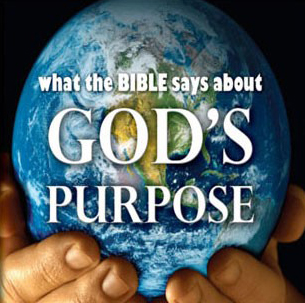




 Adam and Eve sinned by eating the forbidden fruit in the garden of Eden. Both they and the serpent were punished. Men and women would die, and would be unable to save themselves from this. But a ray of hope for man comes into this dark picture when God says to the serpent:
Adam and Eve sinned by eating the forbidden fruit in the garden of Eden. Both they and the serpent were punished. Men and women would die, and would be unable to save themselves from this. But a ray of hope for man comes into this dark picture when God says to the serpent: The basic elements of the Gospel were understood by Abraham. But these vital promises were to Abraham and his seed, Jesus. Can anyone else be involved? Even physical descent from Abraham would not automatically make someone part of that one specific seed (John 8:39). To share these promises we have to become intimately part of Jesus. This is by baptism into Jesus (Romans 6:3-5); frequently we read of baptism into His name (Acts 2:38; 8:16; 10:48; 19:5).
The basic elements of the Gospel were understood by Abraham. But these vital promises were to Abraham and his seed, Jesus. Can anyone else be involved? Even physical descent from Abraham would not automatically make someone part of that one specific seed (John 8:39). To share these promises we have to become intimately part of Jesus. This is by baptism into Jesus (Romans 6:3-5); frequently we read of baptism into His name (Acts 2:38; 8:16; 10:48; 19:5).







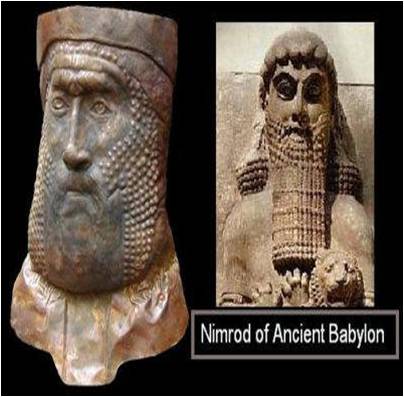 Legends are difficult to prove; they are almost impossible to disprove. Nimrod, the mighty hunter before (against) the Lord, was the first to organize cities into a kingdom under human rule, Genesis 10:8-10. This much we know from the Bible. The name Nimrod comes from the word, marad, meaning “he rebelled.” Legend has it that Nimrod married his own mother, Semiramis. After Nimrod died, Semiramis claimed Nimrod was the sun-god. She later had a child, Tammuz, whom she claimed was Nimrod reborn, supernaturally conceived, the promised seed, the “savior.” Semiramis developed a religion of mother and child worship. Symbols were used to develop a “mystery” religion. Since Nimrod was believed to be the sun-god (Baal), fire was considered his earthly representation. In other forms, Nimrod was symbolized by sun images, fish, trees, pillars, and animals. Tammuz, son of the sun-god, was represented by the golden calf. And so it was, that mankind followed this religion of worshipping the creation (creature) rather than the Creator, Romans 1:21-26.
Legends are difficult to prove; they are almost impossible to disprove. Nimrod, the mighty hunter before (against) the Lord, was the first to organize cities into a kingdom under human rule, Genesis 10:8-10. This much we know from the Bible. The name Nimrod comes from the word, marad, meaning “he rebelled.” Legend has it that Nimrod married his own mother, Semiramis. After Nimrod died, Semiramis claimed Nimrod was the sun-god. She later had a child, Tammuz, whom she claimed was Nimrod reborn, supernaturally conceived, the promised seed, the “savior.” Semiramis developed a religion of mother and child worship. Symbols were used to develop a “mystery” religion. Since Nimrod was believed to be the sun-god (Baal), fire was considered his earthly representation. In other forms, Nimrod was symbolized by sun images, fish, trees, pillars, and animals. Tammuz, son of the sun-god, was represented by the golden calf. And so it was, that mankind followed this religion of worshipping the creation (creature) rather than the Creator, Romans 1:21-26.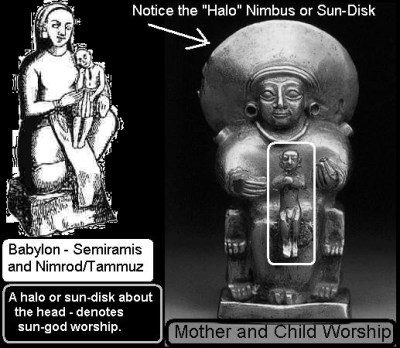 Pictures are worth a thousand words. If you doubt the common origin of many pagan practices, pictures showing the striking similarity should convince you. Many pagan religions had mother and child worship, whether Devaki and Crishna (India), Isis and Horus (Egypt), Venus or Fortuna and Jupiter (Rome), etc. Each nation gave different names to essentially the same god or goddess.
Pictures are worth a thousand words. If you doubt the common origin of many pagan practices, pictures showing the striking similarity should convince you. Many pagan religions had mother and child worship, whether Devaki and Crishna (India), Isis and Horus (Egypt), Venus or Fortuna and Jupiter (Rome), etc. Each nation gave different names to essentially the same god or goddess. 
 YES IT DOES MATTER!!!
YES IT DOES MATTER!!!
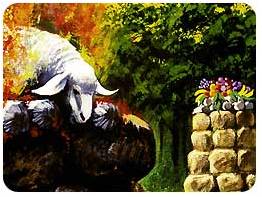
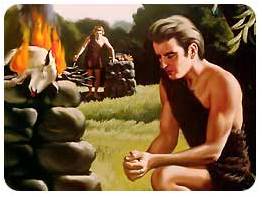




 extremely dangerous and the firefighters had to apply their skills with great care.
extremely dangerous and the firefighters had to apply their skills with great care. “He who believes and is baptized shall be saved” (Mark 16:16).
“He who believes and is baptized shall be saved” (Mark 16:16).
 Followers of Christ
Followers of Christ